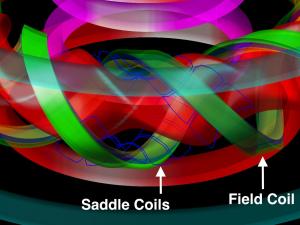Measuring hard-to-diagnose 3D plasmas
25 Mar 2013
Read more here.
A simulated plasma in the Large Helical Device showing the thin blue saddle coils that researchers used to make diagnostic measurements with the new computer code.
Scientists at the US Department of Energy's Princeton Plasma Physics Laboratory (PPPL) and the National Institute for Fusion Science (NIFS) in Japan have developed a rapid method for meeting a key challenge for fusion science. The challenge has been to simulate the diagnostic measurement of plasmas produced by twisting, or 3D, magnetic fields in fusion facilities. While such fields characterize facilities called stellarators, otherwise symmetric, or 2D, facilities such as tokamaks also can benefit from 3D fields.
Researchers led by PPPL physicist Sam Lazerson have now created a computer code that simulates the required diagnostics, and have validated the code on the Large Helical Device stellarator in Japan. Called "Diagno v2.0," the new program utilizes information from previous codes that simulate 3D plasmas without the diagnostic measurements. The addition of this new capability could, with further refinement, enable physicists to predict the outcome of 3D plasma experiments with a high degree of accuracy.


